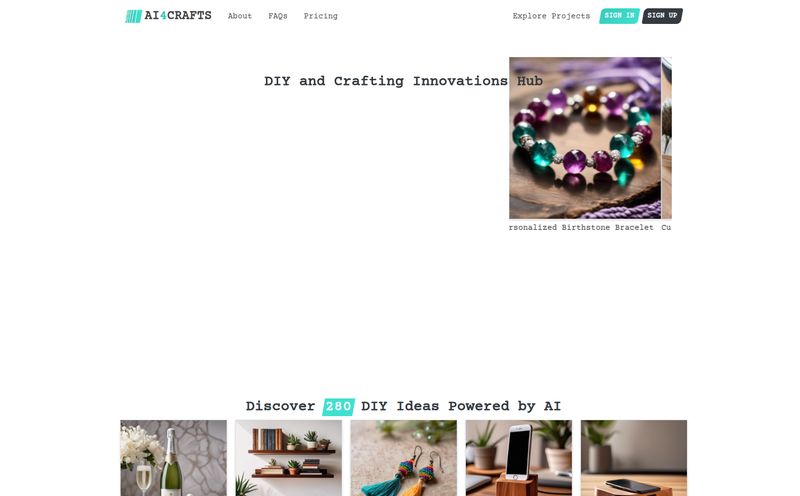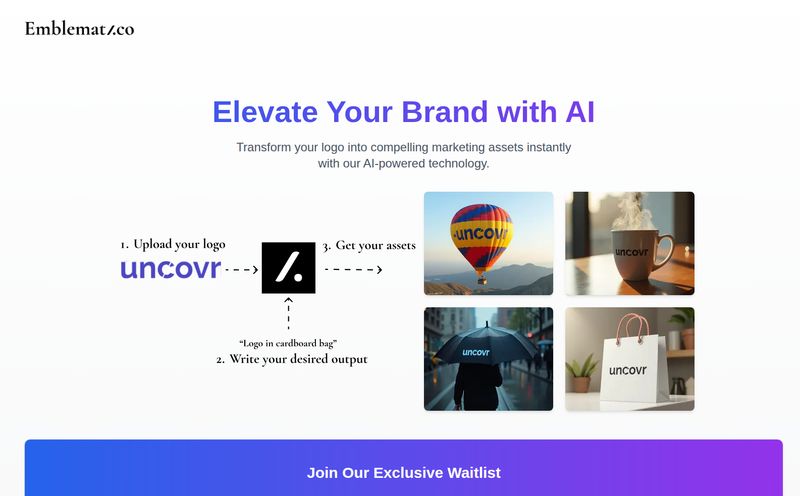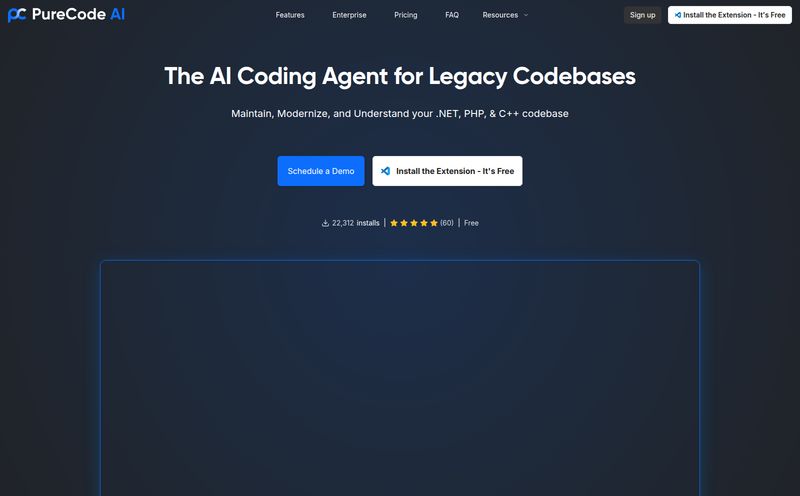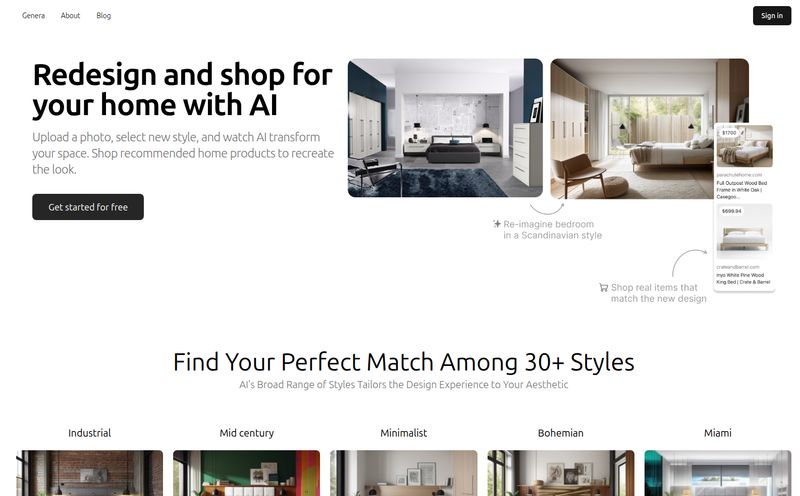If you've ever had a brilliant startup idea, you've probably hit the wall. You know the one. It’s that giant, soul-crushing barrier between your game-changing concept and a tangible product you can actually show someone. You need a product to get funding, but you need funding to hire the designers and developers to build the product. It's the classic startup Catch-22.
For years, I've watched countless founders with incredible ideas get stuck in this exact loop. They either burn through their savings trying to hire a freelance dev, get lost in the weeds of no-code builders that are never quite right, or worse, their idea just withers on the vine. It’s a tragedy, honestly.
But what if you could sidestep that whole mess? What if you could turn your idea into a slick, clickable, investor-ready prototype in minutes, not months? That's the promise of a platform I’ve been digging into lately called fn7. It’s making some bold claims, so I had to see what the fuss was about.
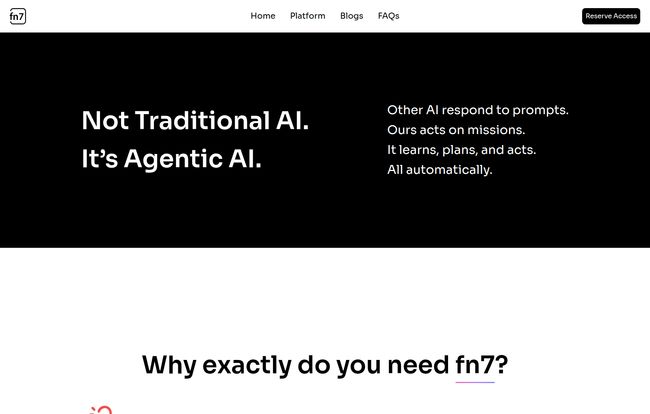
Visit fn7 Helix
So, What Exactly is This fn7 Platform?
Okay, so when I first landed on their site, I saw a lot of talk about "Agentic AI" and a "GTM Crew" designed to fix your growth machine. Think AI agents for marketing, sales, and strategy. Pretty cool. But then I dug a little deeper and found fn7 Helix, which is their AI-powered service for creating prototypes and MVPs. At first, I was a bit confused – is it a marketing tool or a product development tool?
Turns out, it’s both. And that’s actually what makes it interesting. The overarching idea behind fn7 isn't just to give you a tool; it's to give you an AI-powered partner for the entire early stage of a startup. They're tackling both sides of the coin: building the thing, and then actually getting the thing in front of people. For this article, I'm going to focus mostly on the product-building side, fn7 Helix, because I think that's where the most immediate magic happens for non-technical founders.
From Napkin Sketch to Clickable Prototype with fn7 Helix
This is the part that got my attention. fn7 Helix is designed specifically for founders who can't code or design. You feed it your idea, and it generates a fully interactive, clickable prototype. Not a static mockup. Not a wireframe. A functional prototype that looks and feels like a real app.
No Designer, No Code, No Problem
The biggest selling point here is speed. We're talking about getting something tangible in a ridiculously short amount of time. The traditional process? Finding a UI/UX designer, weeks of back-and-forth on wireframes, then mockups, then finally a clickable prototype… it can take months and cost a small fortune. Helix claims to do it in minutes. That’s a monumental shift. It essentially democratizes the very first, and often most expensive, step of building a tech startup.
More Than Just a Pretty Interface
But a prototype isn't just for looking good in a pitch deck (though it certainly helps). The real value of what Helix creates is in validation. You get a link you can send to potential users to get real-world feedback. You can see how people interact with your concept before you write a single line of code. Are they clicking where you expect? Are they getting confused? This is gold. This is the kind of data that stops you from building a product nobody actually wants. It's about failing faster and cheaper, so you can succeed sooner.
But Wait, About That AI Marketing Crew…
Remember that "Agentic AI" I mentioned? This is the other half of the fn7 ecosystem. While Helix builds your prototype, their GTM (Go-to-Market) Crew of 7 AI agents—with names like Scout, Hunter, and Oracle—is designed to handle your growth. They're not just responding to prompts; fn7 says they operate on missions. You tell them the goal (e.g., "find new market opportunities"), and they go to work. This is the future Satya Nadella and Sundar Pichai are talking about – AI as a true co-pilot.
While this is a whole other rabbit hole, it completes the picture. fn7's vision is to help you build the car (Helix) and then provide an AI chauffeur to drive it (the GTM Crew). It’s an ambitious, holistic approach to the startup grind.
Let's Talk Money: fn7 Pricing
Alright, so what’s this going to cost? It's definitely not a $10/month SaaS tool, but it's positioned as an alternative to hiring agencies or full-time staff, and the pricing reflects that. Based on their pricing page, it looks like they have two main offerings for product creation:
- Mock Product: This starts at $2000 for a single user flow. You get the interactive mock product with user analytics built-in. For another $500, you can get it to be responsive for both mobile and desktop. This seems like the perfect option for pure idea validation and early-stage investor pitches.
- MVP Development: This is a bigger leap, starting at $5000 for one user flow. Here, they're not just mocking it up; they're building a functional Minimum Viable Product. You can also add AI features to your MVP for a 20% surcharge. This tier is for when you've validated the idea and are ready to build the first real version of your product.
Now, I know what you're thinking. A few grand isn't pocket change. But let’s put it in perspective. Ask any agency for a quote to design and build a high-fidelity prototype or a simple MVP. You'll likely be looking at 5x to 10x that amount. So, from a value perspective, if the quality is there, this pricing is actually pretty disruptive.
The Good, The Bad, and The AI-Generated
No tool is perfect, right? From my analysis and the information available, here’s my honest take on the pros and cons.
On the plus side, the speed is undeniable. Going from idea to interactive prototype in days or even hours is a superpower for a founder. It drastically lowers the barrier to entry and allows for rapid iteration. The cost-effectiveness compared to traditional routes is also a massive win. And the built-in validation tools mean you’re not just getting a pretty design; you’re getting a learning machine.
On the flip side, you have to be realistic. An AI-generated prototype might not capture the exact unique nuance of your vision right out of the box. I imagine there's still some customization and tweaking required to get it perfect. For the creative founders who are also closet designers, giving up that granular control to an AI might feel a bit weird. Also, a key detail I found is that access to the generated prototypes is limited to 12 months. That's something to keep in mind; it’s a runway, not a permanent home.
Is fn7 the Right Tool for Your Startup?
So, who is this really for? In my opinion, fn7 Helix is a near-perfect fit for a few specific profiles:
- The Non-Technical Founder: This is the bullseye. If you have the vision but not the coding or design skills, this is your bridge over the technical moat.
- The Bootstrapped Startup: If you're running on a tight budget, this provides a professional outcome for a fraction of the traditional cost.
- The Rapid Validator: Have a bunch of ideas and want to see which one has legs? This platform could let you test 3-4 concepts for the price of traditionally developing one.
If you're a seasoned developer with a very specific, complex technical vision or a design agency, this might not replace your existing workflow. It's a tool for starting, for validating, and for moving incredibly fast at the most critical stage of a company's life.
Frequently Asked Questions about fn7
- Do I need to know how to code to use fn7 Helix?
- Absolutely not. The entire platform is designed for non-technical users. You bring the idea, and the AI handles the design and prototype creation.
- What’s the main difference between the Mock Product and the MVP?
- The Mock Product is a high-fidelity, clickable prototype primarily for validation, user testing, and investor pitches. The MVP Development is the next step: a functional, coded first version of your product that can be launched to early users.
- How secure is the platform?
- According to their website, security is a major focus. They mention AES-256 encryption, isolated core systems, running on Google Cloud's Kubernetes Engine (GKE), and being OWASP Top 10 covered. It sounds like they take it very seriously.
- What are the 7 AI agents in the GTM Crew?
- The agents are named Scout, Muse, Hunter, Spark, Echo, Nudge, and Oracle. Each is designed for a different aspect of go-to-market strategy, from finding market trends and competitors to optimizing ad campaigns.
- Is the pricing a one-time fee or a subscription?
- The Mock Product and MVP Development appear to be one-time project fees for specific user flows. However, the MVP plan mentions a platform subscription of $200/month, likely for hosting and maintenance of the live application.
Final Thoughts
Look, the startup world is brutal. Anything that gives a passionate founder a better chance to succeed gets a thumbs-up from me. fn7 and its Helix platform feel like a genuine step forward. It’s not just another tool; it’s a new way of thinking about launching a business. By merging AI-driven product creation with AI-driven growth marketing, they're building a system to tackle the biggest hurdles a new company faces.
It won't be the perfect solution for everyone, and it won’t build your entire business for you. But it might just be the most powerful launchpad a non-technical founder could ask for. And in a world where speed is everything, that’s a pretty big deal.
